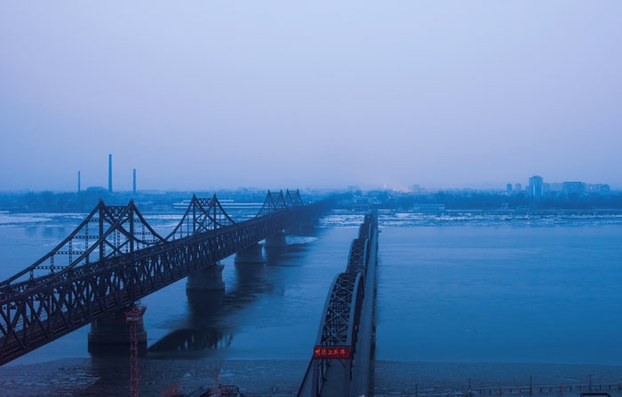North Korean travel to China drops as Pyongyang blocks assassination news
| Publisher | Radio Free Asia |
| Publication Date | 23 February 2017 |
| Cite as | Radio Free Asia, North Korean travel to China drops as Pyongyang blocks assassination news, 23 February 2017, available at: https://www.refworld.org/docid/58f9cb09a.html [accessed 21 May 2023] |
| Disclaimer | This is not a UNHCR publication. UNHCR is not responsible for, nor does it necessarily endorse, its content. Any views expressed are solely those of the author or publisher and do not necessarily reflect those of UNHCR, the United Nations or its Member States. |
2017-02-23
 The Yalu River in the Chinese border town of Dandong, opposite the North Korean town of Sinuiju, Feb. 8, 2016. AFP
The Yalu River in the Chinese border town of Dandong, opposite the North Korean town of Sinuiju, Feb. 8, 2016. AFP
The number of North Koreans crossing the border into China dropped sharply this month following the murder in Malaysia of national leader Kim Jong Un's estranged half-brother Kim Jong Nam, suggesting efforts by Pyongyang to keep news of the killing from reaching North Korean residents, sources say.
Kim Jong Nam, a purported advocate for political reforms in North Korea and open critic of the regime, died on Feb. 13 on his way to a hospital after being attacked with a chemical spray as he prepared to board a flight from Kuala Lumpur to Macau, in China.
Malaysian police have arrested four suspects, including a North Korean national, as suspects in the crime, and have said that four other North Koreans wanted in connection with the case fled the country on the day Kim died.
Now, restrictions appear to have been imposed on the movements of North Korean traders hoping to travel into China on business or to return to North Korea, sources on the border say.
A Chinese customs office in Dandong, just across the Yalu River from North Korea, has reported fewer than 10 North Korean residents crossing the border each day since Feb. 20, a local source told RFA's Korean Service.
"This is a very small number compared to the numbers that crossed at this same time last year," RFA's source said, speaking on condition of anonymity. "This seems to be an after effect of Kim Jong Nam's assassination."
Concerns over television news
South Korean television programs are filled each day with news of the murder, and can be easily seen in China, the source said.
"North Korean authorities are certainly aware of this, and are not going to allow North Korean residents to visit China," he said.
Another source in China told RFA that authorities are similarly blocking North Korean traders already in China from returning home to speak by telephone with their head offices in Pyongyang.
"North Korean traders are not getting authorities' permission to go to Sinuiju, across the border, for business talks," the source said.
These restrictions, too, appear to be aimed at preventing stories of Kim Jong Nam's death from reaching North Koreans, he said.
"These measures will probably continue until the controversies over the assassination die down," he said.
Reported by Joonho Kim. Translated by Soo Min Jo. Written in English by Richard Finney.
Link to original story on RFA website
